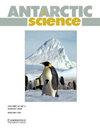The emerging contribution of Türkiye to Antarctic science and policy
IF 2
4区 地球科学
Q3 ENVIRONMENTAL SCIENCES
引用次数: 2
Abstract
Antarctica is a continent dedicated to ‘peace and science’ and subject to international consensus-based governance through the Antarctic Treaty System. Through the Treaty, decision-making powers are reserved to Consultative Parties, which are those countries recognized as demonstrating ‘substantial scientific research activity’ in Antarctica. Türkiye acceded to the Antarctic Treaty in 1996. In its National Polar Science Program (2018–2022) it first declared a desire to attain consultative status to the Treaty. Here, we examine Türkiye‘s recent development across Antarctic science, policy and logistics. Since 2016, Türkiye’s national Antarctic scientific output has increased threefold, ranking seventh amongst the current 27 non-Consultative Parties, and this output is greater than some Consultative Parties. Türkiye has submitted more papers to the Antarctic Treaty Consultative Meetings than any other non-Consultative Party and is actively participating in the development of the Antarctic Protected Area system. To facilitate longer-term research goals, Türkiye is constructing an Antarctic research station (Horseshoe Island, Antarctic Peninsula), has joined several polar organizations, including the Scientific Committee on Antarctic Research (SCAR) and the Council of Managers of National Antarctic Programs (COMNAP), and has developed scientific and logistical collaborations with many established Antarctic nations. The exceptionally rapid growth of Türkiye's Antarctic activities provides a firm foundation for the development of a future application for consultative status.土耳其对南极科学和政策的新贡献
南极洲是一个致力于“和平与科学”的大陆,并通过南极条约体系接受基于国际共识的治理。根据《条约》,决策权保留给协商国,即那些被承认在南极洲开展“大量科学研究活动”的国家。土耳其于1996年加入了《南极条约》。在其国家极地科学计划(2018-2022)中,它首次宣布希望获得该条约的咨商地位。在这里,我们考察土耳其最近在南极科学、政策和物流方面的发展。自2016年以来,土耳其的国家南极科学产出增长了三倍,在目前的27个非协商国中排名第七,而且这一产出超过了一些协商国。土耳其向《南极条约》协商会议提交的文件比任何其他非协商缔约国都多,并积极参与南极保护区制度的发展。为了促进长期研究目标,土耳其正在建造一个南极研究站(南极半岛马蹄岛),并加入了几个极地组织,包括南极研究科学委员会(SCAR)和国家南极计划管理者理事会(COMNAP),并与许多已建立的南极国家开展了科学和后勤合作。土耳其南极活动异常迅速的增长为今后申请咨商地位奠定了坚实的基础。
本文章由计算机程序翻译,如有差异,请以英文原文为准。
求助全文
约1分钟内获得全文
求助全文
来源期刊

Antarctic Science
地学-地球科学综合
CiteScore
3.60
自引率
6.20%
发文量
42
审稿时长
3 months
期刊介绍:
Antarctic Science provides a truly international forum for the broad spread of studies that increasingly characterise scientific research in the Antarctic. Whilst emphasising interdisciplinary work, the journal publishes papers from environmental management to biodiversity, from volcanoes to icebergs, and from oceanography to the upper atmosphere. No other journal covers such a wide range of Antarctic scientific studies. The journal attracts papers from all countries currently undertaking Antarctic research. It publishes both review and data papers with no limits on length, two-page short notes on technical developments and recent discoveries, and book reviews. These, together with an editorial discussing broader aspects of science, provide a rich and varied mixture of items to interest researchers in all areas of science. There are no page charges, or charges for colour, to authors publishing in the Journal. One issue each year is normally devoted to a specific theme or papers from a major meeting.
 求助内容:
求助内容: 应助结果提醒方式:
应助结果提醒方式:


